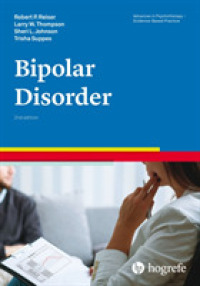- ホーム
- > 洋書
- > 英文書
- > Politics / International Relations
Full Description
The Political Theology of Hannah Arendt clarifies how to understand Arendt's arguments about freedom, collective action, and the problem of evil as political theological, rather than political theoretical or philosophical. To achieve this, Weinman offers a comparative reading of Arendt's engagement with Augustine, from her 1929 dissertation through to The Life of the Mind, which she was working on when she died in 1975. Weinman's innovation is to not only read both works together, but to also read them in light of Arendt's discussion of Augustine in key passages taken from all her works written in the decades between them. Arendt's attempt to reconcile liberal commitments with the Augustinian tradition makes clear why Arendt and not Carl Schmitt ought to be read as offering the preeminent response to Max Weber's theory of modernity as inescapably secular, the result of irreversible processes of disenchantment.
Contents
Acknowledgements
List of Abbreviations
Introduction: Refiguring Arendt's Corpus as Interventions in Political Theology
1. Weimar Syndrome: Der Liebesbegriff and Weber's Disenchantment Thesis
2. Paradoxes of Popular Sovereignty: The People's Two Bodies after Max Weber's Disenchantment Thesis
3. Three Antinomies of Liberalism as a Political Theology: Foundations in Willing
4. Constituting and Constituted Power: The Antinomy of Theocratic Faith and Secular Reason in On Revolution
5. The Eschaton of Liberalism as a Political Theology: Popular Sovereignty Without Exclusion
Epilogue: Arendtian Political Theology and Neighbor-love as Political Principle
Bibliography








